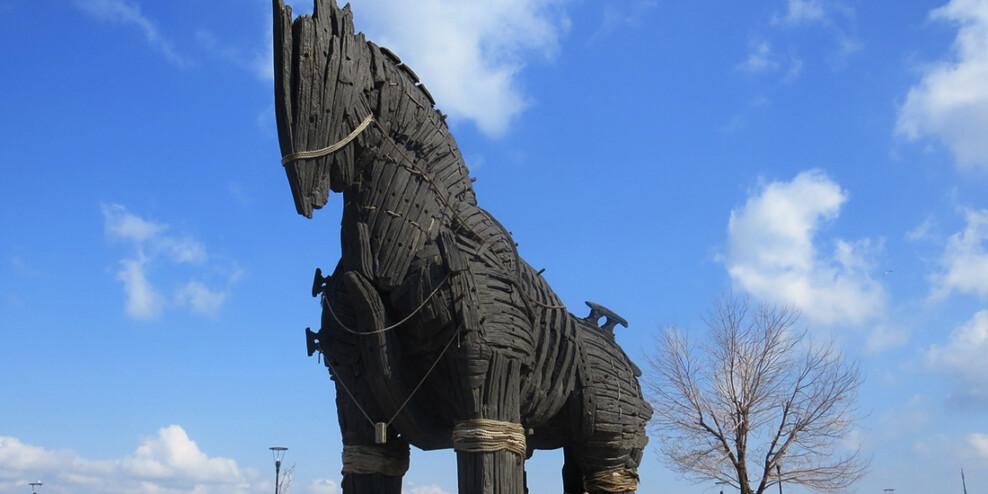“Trojan horse” is one of those terms that gets thrown around as if everyone knows what it means.
But if you’re like me and didn’t have a clue, you just nodded and said, “oh yeah, for sure, definitely!” whenever someone used it.
For the longest time, I thought, “yep, this must be something about condoms.” But I was very, very wrong.
Here is an example that’s happening right now. Doctors are worried that COVID is a Trojan horse for dementia. But what do they mean by that? They mean that all of the nasty COVID symptoms in the brain might later turn into memory problems.
But what is this thing about a horse?
Where it came from
The term Trojan horse comes from ancient Greek legends. It’s a bit of a long story, so you can skip to the end if you want the short version!
The Achaeans spent 10 years fighting the Trojans and trying to take over their city of Troy. The city had an enormous wall around it, and the only way in was through the gate.
They were trying to take back Helen – the most beautiful woman in the world – because she went off with Paris, a Prince of Troy.
The whole story is more complicated than Game of Thrones. Seriously. What you need to know is that after 10 years, things were not going well.
So Odysseus, a military leader for the Achaeans, came up with a plan.
He had his army build a huge, hollow horse out of wood. Then they hid a bunch of soldiers inside the horse. Even Odysseus jumped inside.
The rest of the soldiers dragged the huge horse to the gates of Troy and pretended to sail away in their ships. The Trojans thought they’d finally won the war. So they hauled the horse through the gates and into their city like a big trophy.
Only once it got dark, the soldiers snuck out of the horse and opened the gates to the city. The rest of the Achaeans hadn’t left. They were only hiding nearby.
And once the gates were open, all of the Achaean soldiers rallied and sacked the city of Troy.
It was pretty epic.
So, according to the story, the Trojan horse was a big wooden statue that was used in a sneaky way to get past the city of Troy’s defences.
What it means now
Nowadays, the term Trojan horse means any trick or strategy that causes someone to invite a threat into their safe space. Once it’s inside, that threat does a whole bunch of damage.
Here’s a silly example. Someone gives you a puppy. What you don’t know is that the puppy is covered in fleas. So you take that sweet puppy home, and before you know it, your whole house is full of fleas.
Is it the puppy’s fault? No! The puppy was just the horse. The shady person who gave you the puppy is the real problem, but your stuff still has fleas in it.
With the COVID example, doctors are worried about how COVID attacks the brain. The disease is really sneaky. It makes our own immune system attack parts of our bodies that it should be keeping safe. The virus can even get inside our brains.
And once it’s inside, it does a lot of damage.
And once that damage is done, our bodies have a much harder time fighting off other brain problems that can lead to dementia.
In this case, COVID is the horse and the hidden soldiers. And our brain is Troy. Our big brains are really good at fighting off trouble, but it’s harder to do that when the soldiers are already inside.
Why it’s useful
Knowing the term Trojan horse is super useful. That’s because it’s a strategy that shady people use all the time.
Some say the pro-virus rallies are really a Trojan horse for the alt-right and hate groups like the Proud Boys. The protesters say that their rallies are for good things, like freedom and democracy. And lots of people at the rallies probably believe that.
But the people who organize the rallies have other plans. What they really want is disruption, chaos and maybe even violence.
So they use rallies about freedom and democracy to sneak in through the gates. And when everyone relaxes because they think the rallies are about safe things that we all agree on, boom—the organizers break out the racism, sexism, and hate.
Now, not everything is a Trojan horse. But, when you learn about the term, it’s hard not to see everything that way. Hell, people can be sneaky sometimes.
But the term is a good tool to have in the toolbox.
And it also helps to know that it really isn’t about condoms.









